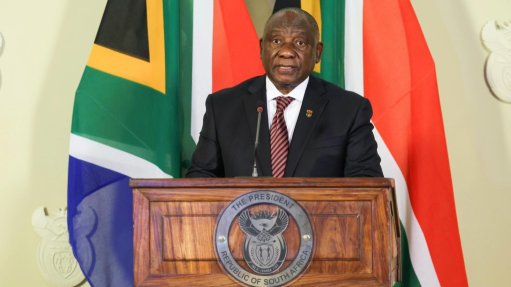Africa’s aid famine
Africa has long been the belle of the ball when it comes to overseas development assistance. But now, as donor countries turn inward thanks to economic hiccups from the Covid-19 pandemic and the Ukraine war, the flow of aid to the continent has dwindled to a trickle, a development some have warned could precipitate a major crisis.
Highlighting the seriousness of the cuts, the European Council on Foreign Relations think-tank reports that EU governments and entities are set to reduce long-term development and climate funding – much of which had been earmarked for Africa – by €4.8-billion.
The reduction – equating to 6% of the yearly development funding from Germany, France and the EU – stems from national dilemmas and political imperatives in the bloc. Germany, for instance, opted to re- direct €2-billion in foreign aid after the country’s apex court blocked the re-allocation of unused Covid-19-era debt to the country’s green transition fund, leaving a huge hole in its budget. Similarly, France, which has also been struggling to balance its books, has decided to cut overseas aid by €800- million, while the European Council, in securing a €50-billion funding package for Ukraine, quietly diverted more than €2-billion from long-term development programmes.
For its part, the UK, an erstwhile EU member and traditionally a world leader in development assistance, has reduced its foreign aid spending from 0.7% of gross national income to below 0.5%.
But it’s not just Europe where aid flows to Africa and other regions have become constrained. Organisation for Economic Cooperation and Development (OECD) statistics reveal that global development assistance for Africa’s 1.4-billion people is now roughly the same as the aid provided to Ukraine, which has a population of only 44-million people.
Another OECD report, released in April and based on preliminary data for 2023, indicates that while development aid to Africa is now at a 20-year low, overall transfers from developed countries have been increasing each year since 2019, even when funds for refugees, the Covid-19 pandemic and Ukraine are excluded.
The reduction in aid flows to Africa is occurring at a time when three-quarters of Africans live in countries that are either in or at risk of debt distress, with several implementing painful austerity measures to avoid default, according to the European Council on Foreign Relations. The distress is particularly acute in countries such as the Democratic Republic of Congo, where 21.7-million people face a food crisis, and Sudan and South Sudan, where 4.4-million people are experiencing a food emergency. Moreover, Ethiopia’s Tigray region has warned that the current situation could far surpass the famine in 1985, which prompted the Live Aid fundraising drive.
The severity of Africa’s situation is brought into sharp focus in this year’s ‘Goalkeepers’ report, which is published by the Bill & Melinda Gates Foundation and assesses global progress towards the UN Sustainable Development Goals. The report reveals that more than half of all child deaths occur in sub-Saharan Africa, that the proportion of the world’s poor people living in this region has increased by more than 20 percentage points since 2010 and that malnutrition continues to be a pressing issue, further endangering its youth.
Juxtaposed with the dwindling aid flows to Africa from the world’s rich nations are the mounting interest payments on the debts African governments owe these nations, which often exceed health and education budgets. This financial strain could jeopardise the wellbeing of young Africans, Bill Bates told journalists in New York last month, during an event marking the release of the ‘Goalkeepers’ report.
Given the strain that debt repayment obligations impose on African nations and other poor nations elsewhere, wealthy nations should seriously consider debt relief. After all, this is not a new idea. Between 2000 and 2015, 31 African nations – out of 36 beneficiary nations – had substantial portions of their debt wiped out. For instance, Malawi and Liberia had 90% of their external debt cancelled, while Sierra Leone received about 95% relief. Bigger economies such as Ghana experienced a lower, but still impressive, decline in debt stock of about 70%.
More relief can still be provided to support these nations.
Article Enquiry
Email Article
Save Article
Feedback
To advertise email advertising@creamermedia.co.za or click here
Announcements
What's On
Subscribe to improve your user experience...
Option 1 (equivalent of R125 a month):
Receive a weekly copy of Creamer Media's Engineering News & Mining Weekly magazine
(print copy for those in South Africa and e-magazine for those outside of South Africa)
Receive daily email newsletters
Access to full search results
Access archive of magazine back copies
Access to Projects in Progress
Access to ONE Research Report of your choice in PDF format
Option 2 (equivalent of R375 a month):
All benefits from Option 1
PLUS
Access to Creamer Media's Research Channel Africa for ALL Research Reports, in PDF format, on various industrial and mining sectors
including Electricity; Water; Energy Transition; Hydrogen; Roads, Rail and Ports; Coal; Gold; Platinum; Battery Metals; etc.
Already a subscriber?
Forgotten your password?
Receive weekly copy of Creamer Media's Engineering News & Mining Weekly magazine (print copy for those in South Africa and e-magazine for those outside of South Africa)
➕
Recieve daily email newsletters
➕
Access to full search results
➕
Access archive of magazine back copies
➕
Access to Projects in Progress
➕
Access to ONE Research Report of your choice in PDF format
RESEARCH CHANNEL AFRICA
R4500 (equivalent of R375 a month)
SUBSCRIBEAll benefits from Option 1
➕
Access to Creamer Media's Research Channel Africa for ALL Research Reports on various industrial and mining sectors, in PDF format, including on:
Electricity
➕
Water
➕
Energy Transition
➕
Hydrogen
➕
Roads, Rail and Ports
➕
Coal
➕
Gold
➕
Platinum
➕
Battery Metals
➕
etc.
Receive all benefits from Option 1 or Option 2 delivered to numerous people at your company
➕
Multiple User names and Passwords for simultaneous log-ins
➕
Intranet integration access to all in your organisation

















